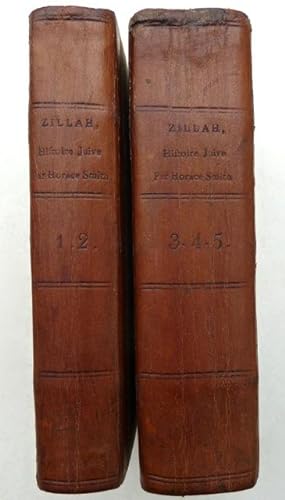About this Item
5 tomes en 2 volumes (cpl.). 2 Bll., XV, 215+2 Bll. 216 SS. resp. 2 Bll., 213+2 Bll., 225+2 Bll., 223 SS. Einfache HLdr. d.Zt. (Deckel etwas fleckig, ob. Kapital von vol. 2 mit sauberer Reparaturstelle) mit gepr. Rückentitel. Edition française originale (seule) / Erste (einzige) französische Ausgabe. Pages différemment avec rousseurs / Seiten unterschiedlich (stock-) fleckig (Vorsätze mehr). Traces d?âge, du stockage et certains d?usage / Alters-, Lagerungs- u. etwas Gebrauchsspuren. En tout exemplaire bien accéptable et assez soigné (bon ex. pour l?usage) / Gesamthaft recht ordentliches, relativ gepflegtes (gutes Gebrauchs-) Exemplar. RERO Nr. R006325140; nicht in BNF u. SUDOC. - Englische Originalversion erstmals 1828 in vier Bänden unter dem Titel: Zillah; a Tale of The Holy City. By the Author of ?Brambletye House?, ?The Tor Hill?, ?Reuben Aspley?, &c. In four volumes. (London, Henry Colburn, New Burlington Street). BVB und Hathi Trust listen aus dem gleichen Jahr eine 3-bändige zweite Auflage ?Second Edition. In three volumes? (London, Colburn). -- Horace Smith (London 31 December 1779-12 July 1849 Tunbridge Wells). ?English poet and novelist, perhaps best known for his participation in a sonnet-writing competition with Percy Bysshe Shelley. [.] He was educated at Chigwell School with his elder brother James Smith, also a writer. Horace first came to public attention in 1812 when he and his brother James (four years older than he) produced a popular literary parody [.]. Smith went on to become a prosperous stockbroker. [.] After making his fortune, Horace Smith produced a series of historical novels [among them Zillah, 1828]? (etc.; from: poemhunter, online). - ?Employed as a clerk, he began his literary career by collaborating with the elderly dramatist Richard Cumberland on several Tory periodicals. Later, as a member of Leigh Hunt's circle, Smith knew Shelley and Keats, worked with Thomas Campbell on The New Monthly Magazine, and contributed prose and verse to the London Magazine. James Smith was solicitor to the Board of Ordnance and the senior partner in the imitations of Horace.? (from: spenserians cath, online). - Offenbar diente ?Zillah? Edgar Allan Poe als Vorlage für eine Kurzgeschichte: ?In this regard, a relatively obscure short story by Edgar Allen Poe, ?A Tale of Jerusalem?, stands entirely in a league of its own. The breadth of familiarity with Rabbinic Literature and Temple protocol, the extent to which this narrative is so replete with abstruse Talmudic references, is, frankly, astounding. Poe goes far beyond mere Talmudic reference; he actually adopts its idiom and syntax, employing free use of Hebrew and Aramaic to color his characters. Much has been written about this story, which was first published in 1832 in the Philadelphia Saturday Courier and later in 1845 in the Broadway Journal. [.] The question which we would like to address is this: how did Edgar Allen Poe, an American gentile of the early 19th century, know about this Talmudic passage and all of the other Talmudic references contained in his story?The overwhelming and irrefutable scholarly consensus is that Poe was masterfully parodying a four-volume behemoth of 18th [err., recte 19th] century British literature, a historical fiction set in the second Temple Era called Zillah: A Tale of the Holy City. The novel, authored by English writer Horace Smith in [err.:] 1779, follows a young girl, Zillah, the daughter of the deputy Kohein Gadol, high priest, on a whirlwind of colorful adventure. In it, Smith displays an encyclopedic familiarity with Rabbinic Literature. It is awash with narratives and factoids from throughout the Mishna, Talmud, and other assorted ancient Rabbinic works.? (etc.; from: thinkjudaism wordpress, online). Sprache: fr. Seller Inventory # Lt011410
Contact seller
Report this item
![]()
